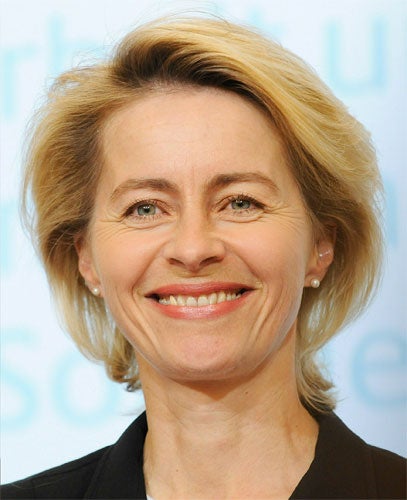Two women on top: Germany set to elect female president

Germany faced the prospect of bec-oming the first European nation in which women hold the top two political posts yesterday, as Chancellor Angela Merkel's Employment Minister Ursula von der Leyen emerged as the clear favourite in the race to become the new federal president.
The 51-year-old mother of seven children, who is one of Germany's most popular politicians, was tipped as the front runner to replace Hörst Köhler, who resigned abruptly from the presidency on Monday, plunging Ms Merkel's ailing coalition government into crisis.
Sources close to the German chancellery said yesterday that Mrs von der Leyen, a conservative Christian Democrat, was Ms Merkel's personal favourite to replace Mr Köhler although the veteran conservative Finance Minister, Wolfgang Schäuble, was also in the running.
Mrs von der Leyen refused to comment directly on suggestions that she was front runner. She told journalists: "A good solution for this country needs to be found, so I'm simply... " and put a finger to her lips to show that she intended to keep silent.
A new election for a the largely ceremonial job of president is set to take place on 30 June in Germany's Federal Assembly, a body comprised of all parliamentary MPs and delegates from the country's 16 federal states. Candidates are fielded by the main political parties and elected by the assembly in which Ms Merkel's coalition has a majority. Mrs von der Leyen's chances of becoming president increased dramatically yesterday after Ms Merkel's liberal Free Democrat coalition partners and Bavaria's Conservative Party opted against fielding their own candidates for the job. Their decision appeared to leave the way open for Mrs von der Leyen. "Things are firming up for her," one Conservative source told Der Spiegel magazine.
Politically, the choice of a woman as president would make Germany arguably the most female-dominated nation in Europe.
Ms Merkel is not only her country's first woman leader but in her chancellery she has surrounded herself with a team of women advisors nicknamed the "Girls' Camp". A woman president would be the icing on the cake. Mrs von der Leyen served as families minister in Ms Merkel's first grand coalition government and won praise for introducing radical reforms to the child benefit system, which made it easier for German mothers to go out to work and fathers to take the option of staying at home to look after children.
The unusual show of unity by Ms Merkel's coalition partners over the choice of the future president showed how much pressure her government is currently under to quickly resolve the political crisis caused by Mr Köhler's sudden departure and get on with the business of imposing draconian public spending cuts to offset the euro crisis.
Yesterday there were unconfirmed reports that the defence ministry was planning to end Germany's post-war practice of army conscription and cut its troop numbers from 250,000 to 150,000 – a measure which could save some €400m (£334m) in spending each year.
There was also speculation about the reasons for Mr Köhler's sudden resignation following criticism of remarks he made which apparently suggested that Germany's military presence in Afghanistan was in order to safeguard German free trade.
Commentators suggested that the real reason for his departure was that he had lost political support, had become oversensitive to criticism and had isolated himself. "Nobody was listening to him any more," wrote the Süddetusche Zeitung newspaper.
Ursula von der Leyen
Her nicknames could hardly be more diverse. Ursula von der Leyen is called "Röschen" (little rose) by friends and family, "Power woman" by her admirers, and "Censorursula" by her critics. Yet the woman tipped to be Germany's first female president probably merits all of them. Photographs of the small, blonde, 51-year-old employment minister show that, as a child, she bore a resemblance to the fictional character Heidi, which could explain "Little Rose".
The daughter of a former prime minister of the German state of Lower Saxony, Mrs von der Leyen was weaned on politics, but studied economics and then medicine, before marrying and having seven children. She did medical research in the US before returning to Germany and going into politics. She has described combining a career with motherhood as one of "the hardest tasks in my life".
A member of Angela Merkel's conservative Christian Democrats, she provoked fierce criticism last year for attempting to ban child pornography on the internet. Freedom of information groups branded her "Censorursula" and the idea was eventually scrapped.
Join our commenting forum
Join thought-provoking conversations, follow other Independent readers and see their replies
Comments
Bookmark popover
Removed from bookmarks